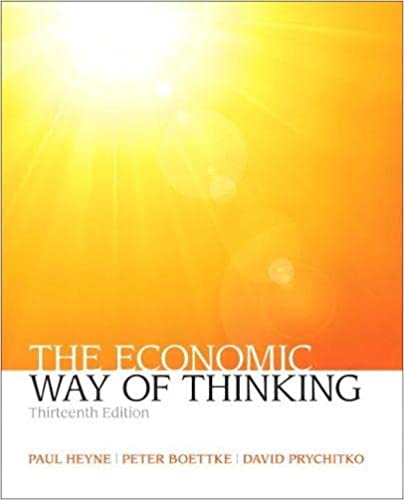
The Economic Way of Thinking 13th Edition by David Prychitko, Peter Boettke, Paul Heyne
Edition 13ISBN: 9780132992695
The Economic Way of Thinking 13th Edition by David Prychitko, Peter Boettke, Paul Heyne
Edition 13ISBN: 9780132992695 Exercise 18
How stringently should ozone be controlled? Federal legislation has set the ozone standard at a level that would prevent any adverse health effects on people who exercise in an area with high ozone concentrations.
(a) Is there any scientific way to decide whether the benefits from a stringent ozone standard are greater than its costs?
(b) According to a New York Times article, 51 percent of the annual emissions of volatile organic compounds that produce ozone at ground level come from the operation of motor vehicles. So we could protect our health either by prohibiting so much driving or by exercising less in those urban areas where, on a few days in the year, ozone levels exceed the standard. Which is the more efficient way to protect our health?
(c) Suppose that industrial solvents create 4 percent of certain harmful emissions and household solvents create 5 percent of them. If we pass legislation to reduce the use of solvents, is the legislation more likely to restrict industrial or household use? Would a restriction on industrial use show that people are more important than profits?
(a) Is there any scientific way to decide whether the benefits from a stringent ozone standard are greater than its costs?
(b) According to a New York Times article, 51 percent of the annual emissions of volatile organic compounds that produce ozone at ground level come from the operation of motor vehicles. So we could protect our health either by prohibiting so much driving or by exercising less in those urban areas where, on a few days in the year, ozone levels exceed the standard. Which is the more efficient way to protect our health?
(c) Suppose that industrial solvents create 4 percent of certain harmful emissions and household solvents create 5 percent of them. If we pass legislation to reduce the use of solvents, is the legislation more likely to restrict industrial or household use? Would a restriction on industrial use show that people are more important than profits?
Explanation
The environmental costs associated with ...
The Economic Way of Thinking 13th Edition by David Prychitko, Peter Boettke, Paul Heyne
Why don’t you like this exercise?
Other Minimum 8 character and maximum 255 character
Character 255


